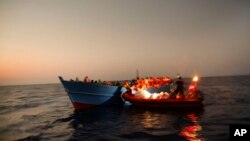In what one rescuer called an “extraordinary day,” about 6,500 people Monday were pulled from some 40 ships off the coast of Libya en route to Europe.
Nicholas Papachrysostomou, field coordinator for Dignity I, a rescue ship in the Mediterranean operated by Doctors Without Borders, or Médecins Sans Frontières (MSF), said the scale is unprecedented.
“All together, the number is awe-inspiring,” Papachrysostomou said. “In the history of search and rescue operation in the central Mediterranean, I don’t think we’ve ever seen this figure on one single day.”
The day began with MSF rescuers responding to a distress call relayed from the Maritime Rescue Coordination Centre in Rome. In a harrowing scene caught on camera by the Associated Press, rescuers encountered 600 to 700 people crammed inside a wooden boat. Nearby were another 18 to 20 rubber boats, each with about 120 people on board, he said.
MSF helped rescue about 3,000 people, and the Italian Coast Guard coordinated efforts to save about 3,500 more in separate operations. Calm water and low-winds during the morning were the reasons for the high numbers of people setting off for Europe that day, Papachrysostomou said.
Many of the refugees were from Eritrea and Somalia, although large numbers also originated from West Africa.
Papachrysostomou said rescuers saw signs of physical abuse, malnourishment and suffering from exposure to the elements.
“The older ones are more vulnerable and the little children,” he said. “We come across cases where people are quite sick (from nausea). There’s hyperthermia. There’s fever. There are a number of conditions as a result of the journey, but we also have to consider that in order to get to Libya these people have had a long journey from their country,” he said as the migrants were being taken to Vibo Valentia, in southern Italy. “So they come with accumulated fatigue - and not just physical but also physiological.”
The rescue made news around the world. Among those waiting anxiously for word was Kifleyesus Abraha, an Eritrean native who now resides in Seattle, Washington.
His phone number was written on a piece of paper that was among the belongings of a rescued Eritrean migrant. The paper also included numbers with country codes for Norway, Sweden and Germany. Alongside it, 20 and 100 Nakfa notes (the Eritrean currency), pictures of the migrant and a calendar were laid out on the boat to dry under the sun.
Abraha is a relative of the migrant and paid about $2,000 to smugglers in Libya to help him cross the Mediterranean.
The migrant’s journey began two years earlier in the town of Halay near Adi-Keyih, Eritrea. He left home because he saw no future there, Abraha said.
“They want to lead their lives freely, and that’s why they left. That is their dream and their first goal is to lead their lives, be it through education and other means, and then they want to help others, families they left behind.”
After leaving Eritrea, a two-year journey took Abraha’s relative from Ethiopia and Sudan to Libya. There, he fell in with smugglers and, according to Abraha, suffered beatings when he didn’t pay the money he owed.
“I know his voice... and I asked him because I was confused. I said why has your voice changed? He said they are beating me because I didn’t pay money and I am in bad condition.”
For Abraha’s relative and untold other migrants, a dramatic rescue at sea is only the latest chapter in a journey controlled by abusive smugglers. That’s why MSF, the Italian Coast Guard and other rescuers see saving lives as part of a broader mission to dismantle the smuggling networks that fuel Mediterranean migration.
To prevent smugglers from reusing their boats, military vessels destroy them after migrants have been safely evacuated, Papachrysostomou said.
These activities are part of Operation Sofia, a European Union effort to curtail migration by disrupting smugglers’ and traffickers’ business models.
Safe and legal passage to Europe is the only way to keep migrants out of the hands of smugglers, Papachrysostomou said.
“And this is why we believe, in Doctors without Borders, we believe that it is very important to reconsider the European policy. It is important to reconsider safe and legal passage because, the moment they don’t have this, this is when they would actually look for the smugglers, and this is where the smugglers become very important because they are the only way to get them across.”





